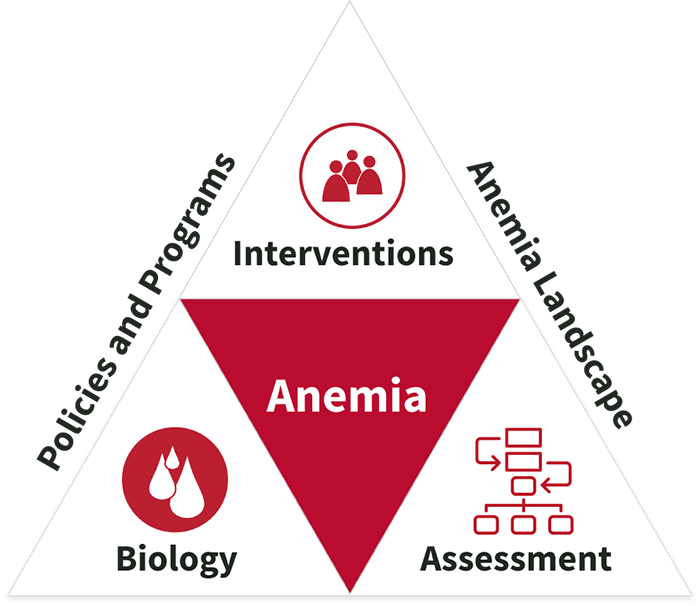Non-dietary interventions for the treatment of anemia include a broad range of approaches including clinical interventions to treat individuals with anemia and other anemia-related conditions or broader public health programs. Non-dietary interventions to reduce anemia include prevention of and treatment for malaria, helminthiasis, tuberculosis, human immunodeficiency virus (HIV), acute or chronic blood loss, and hemolytic genetic disorders.
Malaria Prevention and Treatment
Malaria control in pregnancy and childhood can take many forms: intermittent preventive regimens in pregnant women through chemoprophylaxis with drugs such as sulfadoxine-pyrimethamine, prevention with use of long-lasting insecticide nets, use of environment vector control methods like indoor residual spraying, and prompt and accurate diagnosis of illness, followed appropriate use of effective anti-malarial drugs.
Deworming for Intestinal Parasites
Population-based deworming programs recommended for children over the age of one and pregnant women by WHO include mass drug administration, targeted chemotherapy, and selective therapy.
Treatment of Anemia of Inflammation Caused by Tuberculosis and HIV
The management of tuberculosis and HIV, the diagnosis and treatment approach to the associated anemia must include determination of etiology (e.g., differentiation between nutritional causes including iron deficiency and genetic hemoglobinopathies) to inform context specific, safe, and efficacious interventions.
Blood Transfusions
Women in Asia and sub-Saharan Africa have an increased risk of anemia from blood loss in the postpartum period compared to their counterparts in other regions of the world. Widespread adoption of comprehensive, evidence-based, up-to-date guidelines would need to effectively occur in the healthcare systems of the most affected populations to have a public health impact. Blood transfusions used to correct the presence of anemia and have the potential to be lifesaving, particularly when loss of hemoglobin is acute, as in postpartum hemorrhage and with severe blood loss in trauma, shock, infections such as malaria, and other emergencies.
Delayed Cord Clamping
Immediate cord clamping at birth causes blood loss in newborns by as much as 25–35 mL per kilogram. World Health Organization guidelines recommend delayed umbilical cord clamping (not earlier than one minute after birth) for improved maternal and infant health outcomes, especially ferritin in the infants. This simple, inexpensive, and safe procedure is accepted as the standard of care for infants not requiring resuscitation.
Management of Inherited Red Blood Cell Disorders
Supportive care such as blood transfusions and pain medication have long been the mainstay of treatment and management of sickle cell anemia and its complications. Management of α- and β-thalassemia, and other transfusion-dependent anemias, is limited to supportive care, including chronic transfusion and iron-chelating therapy. Management of Glucose-6-phosphate dehydrogenase (G6PD) deficiency includes avoidance of known triggers (e.g., fava beans), widespread screening for the presence of G6PD deficiency, and in absence of widespread screening, the use of low dose primaquine for chemoprophylaxis of malaria endemic regions (to reduce population level risk of hemolysis in these individuals).
Limited data exists on the direct impact of the COVID-19 pandemic on nutritional status, beyond the obvious secondary effect on food insecurity, and the value of dietary/nutritional interventions, particularly in the context of anemia. As we all continue to learn from the impact of SARS-COV-2, we do not address COVID-19 in this toolkit.
Research has demonstrated the potential benefits of delayed cord clamping, deworming, anti-malaria treatment, and therapeutic clinical treatment such as blood transfusions as interventions to address the issue of anemia to varying degrees, in complex scenarios, and at times with conflicting evidence. Key factors that inhibit and motivate the desired behaviors should be considered and addressed through these interventions.
We found 17 resource(s)



